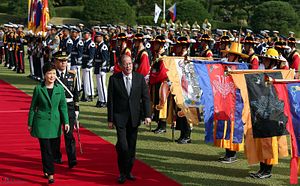South Korea and the Philippines have agreed to deepen their military ties following talks by their defense ministers, media outlets reported Monday.
As I have written previously, Seoul and Manila have recently been deepening their ties, particularly in the defense realm, as the Philippines looks to modernize its military in part to counter China’s growing assertiveness in the South China Sea. In December 2014, on the sidelines of the 25th ASEAN-Republic of Korea Commemorative Summit, Philippine President Benigno Aquino III had suggested that the two countries form a “comprehensive strategic partnership” (See: “Philippines, South Korea Eye Stronger Partnership Amid Chinese Protests”).
This week, South Korean Defense Minister Han Min-koo paid a two-day visit to the Philippines, where he held talks with his Filipino counterpart, Secretary Voltaire Gazmin.
The highlight of the visit was the signing of a new five-year pact to regulate and protect the exchange of classified military information. According to Philippine officials, the agreement will help keep them better informed of developments on the Korean Peninsula in order to better protect tens of thousands of Filipino workers who currently reside there. The deal is a follow-up to a preliminary agreement on defense cooperation reached in October 2013.
South Korea’s defense ministry also said that the two defense chiefs had agreed to increase exchanges of ranking military officials and beef up joint cooperation against non-traditional and transnational threats.
At a press conference following his meeting with Gazmin, Han said he expected several defense deals between the two countries to go on as planned. South Korean firms are currently participating in key Philippine defense modernization projects. State-owned Korea Aerospace Industries has agreed to provide Manila with 12 FA-50 fighter jets, with the first two scheduled to arrive by the end of the year (See: “Philippines to Revive Former US Naval Base Near South China Sea in 2016”). South Korean firms are also in the running for a separate frigate program.
“The transfer of assets will go as planned,” Han said.
As for the South China Sea, Han urged all parties to abide by the declaration on conduct in the South China Sea and work toward the speedy conclusion of a binding code of conduct in the spirit of mutual respect, cooperation, and understanding.
“It is my stance that the relevant nations surrounding this area and this situation should solve this situation based on mutual respect towards each other’s sovereignty and mutual cooperation and mutual understanding of each nation’s perspective,” he added.































